2017 GMC Yukon XL Denali
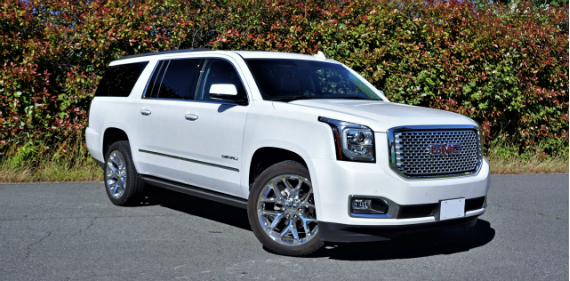
A superb full-size SUV worthy of its large and loyal following
Remember when full-size truck-based SUVs were the environmental equivalent of the antichrist? Hummer was the “Chucky” poster child brand of everything automotively evil, and its 2010 demise at least partially due to socially falling out of favor with the do-gooder elite that helped it get a foothold in the mainstream market in the first place.
That would be pre-California governator Arnie Schwarzenegger in the driver’s seat, the real Col. John Matrix even influencing the design of GM’s Tahoe/Yukon-based H2 before turning up personally to introduce it in concept form at the 2001 New York auto show. Not long after it became politically incorrect to be seen in anything so carelessly gluttonous with fossil fuels (he first ran for governor in 2003 and was elected in 2006), a photo of Arnold spinning a globe of the world on his finger with the words “Save the Planet — Or Else” on the cover of Newsweek comes to mind. His environmental scorecard wasn’t exactly Agent Orange, but then again it wasn’t anywhere near as green as predecessor Gray Davis’ agenda, or for that matter Jerry Brown that both preceded and immediately followed, but the True Lies star had to at least look more like a steward than a predator.
Not anymore. Arnold drives an even bigger military grade Hummer H1 now, while relatively cheap gas/diesel and even cheaper money has caused a spike in the number of big SUVs leaving domestic and imported brand showrooms. Only Toyota’s Sequoia (what’s that you ask?) has taken a downturn in recent years, with every other full-size mainstream branded SUV having enjoyed their best 12 months in a very long time through 2016, if not ever. GM dominates this segment, with 253,889 Chevy Tahoes/Suburbans and GMC Yukons down the road last year, while the next-best Ford Expedition found just 59,835 buyers. Nissan’s new Armada saw considerable growth in 2016 with 13,834 sales, whereas the aforementioned Sequoia dropped to 12,771 units.
Sequoia sales continued to fall while Armada numbers have grown throughout 2017, albeit nominally compared to the top two automakers in this segment. Still, while the Expedition will sell in much greater numbers than its Asian competitors it won’t reach last year’s high when this current calendar year comes to an end due to just 46,425 units delivered after 11 months, while Yukon will struggle to achieve 2015 numbers with only 69,290 units down the road after November ended (2016 was a banner year of 90,501 units). Even the two Chevy SUV’s total of 139,418 units over the same 11 months won’t reach 2016 levels.
Just for fun, can you guess how many plug-in hybrids and full-electric vehicles sold during 2016? Out of 30 unique offerings, U.S. sales totaled a mere 159,139 units compared to 340,329 delivers from just 7 full-size SUVs (four of which are technically the same vehicle), and that’s after baiting customers with mega government handouts. So much for the environmental movement hitting the mainstream.
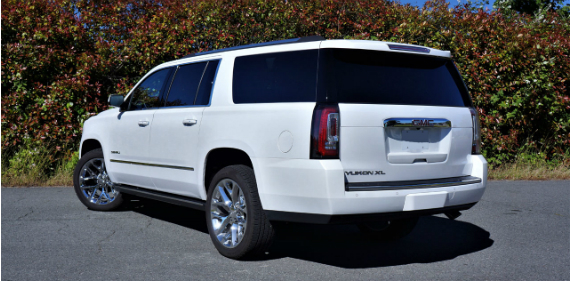
To GM’s credit, its Chevrolet Volt was a major player on that list of 30 plug-in models, while the new Bolt EV is a very real, semi-affordable electric that consumers can buy en masse now—no jab at Tesla intended. These (likely) money-losing bowtie projects are funded by the aforementioned high-profit SUVs, as well as even higher profit pickup trucks, ultra-popular crossover SUVs, and a number of strong selling conventionally powered cars (the new Malibu is superb, by the way), which is just another reason for Arnie and company to once again embrace big SUVs.
Don’t get me wrong. I fully respect and appreciate Arnold Schwarzenegger; I loved Hummer, especially the final H2 and H2 SUT while rock-crawling around Aztec, New Mexico in 2008; and I adore the Yukon, especially this mammoth Yukon XL, GMC’s version of the 14-inch extended-wheelbase Chevy Suburban, making both 20 inches longer overall and more than doubling cargo capacity behind the third row. The Denali is even better, coming close to the ultimate Cadillac Escalade ESV experience without the, “In yo’ face mutha f…” hip-hop star attitude.
In fact, I might have received more compliments while living with the Yukon XL than any other vehicle this year. People absolutely love it. Rarely do I get guys stopping at the crosswalk giving me thumbs up, one even putting his hands over his heart before pointing at the grille, but this big white beast really had a positive effect on passersby. How different than being scorned by plenty more than a decade ago while at the wheel of a then-new Tahoe Hybrid. While I expected the negative SUV sentiment to increase over the years, it appears not to be the case. Instead, land yacht lovers seem to be able to openly express their enthusiasm once again, and I can understand why. The Yukon is a great looking SUV, especially in Denali trim.
Its massive 420-horsepower 6.2-liter V8 feels like it’s got enough twist on tap to spin the world in the opposite direction when accelerating westward, its standard 275/55R20 or even meatier as-tested 285/45R22 rubber churning asphalt from all four corners via an efficient eight-speed automatic fed by 460 lb-ft of torque—that gearbox will increase to 10 forward speeds for 2018. Despite pushing 5,743 lbs of bulk it feels light on its feet, its ability through fast-paced corners perplexingly good, especially when considering it’s the automotive equivalent of a cruise liner. Optimal luxury in mind, the Yukon Denali XL’s ride is sublime, while it might be the ultimate highway companion thanks to a near effortless ability to cruise at high speed comfortably all day.
I thought you’d never ask, but now that you have the Yukon XL’s EPA fuel economy rating is 15 mpg city, 22 highway and 17 combined with the base 5.3-liter V8 and RWD, while that engine with 4WD is good for a claimed 14 mpg city, 20 highway and 16 combined. The as-tested Yukon XL Denali gets a 15-mpg city, 20 highway and 17 combined rating, which is actually pretty good compared to some full-size SUV rivals.
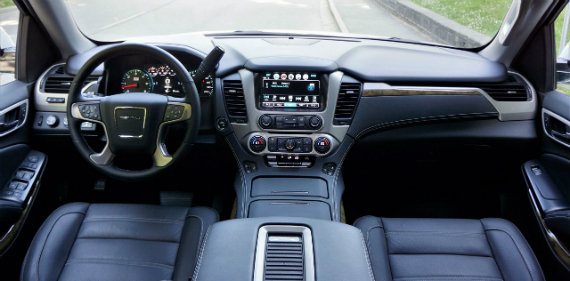
All Yukons get new active front aero shutters to improve highway economy for 2017, by the way, while additional 2017 updates include a new “Teen Driver” feature that allows some parental guidance when the big ute is out of site with kids at the wheel. Lastly, low-speed forward automatic braking is now optional on lesser models and standard with the Denali.
Other than the obvious chromed styling enhancements and larger engine, multi-speedier transmission, and 20-inch rims, the XL Denali includes a standard magnetic ride control suspension, a heavy-duty trailering package with an integrated trailer brake controller, a transmission oil cooler, HID headlights with auto high beams, fog lamps, an acoustic laminated windshield, rain-sensing wipers, heatable power-folding side mirrors, chrome-accented assist steps, proximity-sensing access with pushbutton ignition, a unique leather-clad interior, a heated leather-wrapped steering wheel, power-adjustable pedals, heated and ventilated power-adjustable front memory seats, an auto-dimming rearview mirror, a universal garage door remote, tri-zone auto climate control, an 8.0-inch customizable color TFT driver information display, a head-up display that projects key info onto the windshield, a rear parking camera, navigation, OnStar with 4G LTE and a built-in Wi-Fi hotspot, wireless phone charging, active noise cancellation, 10-speaker Bose Centerpoint Surround audio, HD and satellite radio, front and rear parking sensors, blindspot monitoring with lane change alert and lane keep assist, forward collision alert, a safety alert driver’s seat, power-folding third-row seats, a powered liftgate, and plenty more.
My stunning White Frost Tricoat-painted tester, a $995 option, was completely loaded up past the Yukon XL Denali’s reasonable $69,960 asking price, with $3,000 4WD, gorgeous $2,900 22-inch six-spoke chromed “Multi-Feature Design” alloys, plus $1,745 power-retractable assist steps that neatly tuck up within the rockers to look like a nice strip of chromed trim.
Additionally, a $2,485 Open Road package added a powered glass sunroof up front and a ceiling-mounted flip-down Blu-Ray DVD entertainment system in back, the latter with Wi-Fi wireless projection capability, a remote, four pair of two-channel wireless digital headphones, a cluster of auxiliary HDMI/MHL audio/video inputs, two rear USB ports, plus nine months of SiriusXM radio and NavTraffic service. Not so obvious but appreciated even more was $895 worth of adaptive cruise control with the fortunately unsung benefit of Automatic Collision Preparation, which replaced the previously noted standard Low Speed Forward Automatic Braking with full forward collision mitigation. There was more, increasing the price by $12,620 for a new total of $81,285 before freight and fees, but we’ll leave it there.
The Yukon bridges the gap between the Tahoe/Suburban and ritzier Cadillac Escalade, while this Denali model pushes the luxury quotient up even closer to the Caddy, while still coming across as an everyday person’s ride. Some finer interior details include stitched leatherette and soft-touch synthetic across the dash top, the same surfacing ahead of the front passenger on the instrument panel, down each side of the center stack, across the edges of the lower console, and finally across all the door uppers. Additionally, contrast-stitched padded leather surrounds the steering wheel, while even the column-mounted shifter gets the upscale treatment, this mirroring the perforated leather upholstery covering the seats, which I must say was a higher grade leather than I’m used to from a non-crested-wreath GM product.
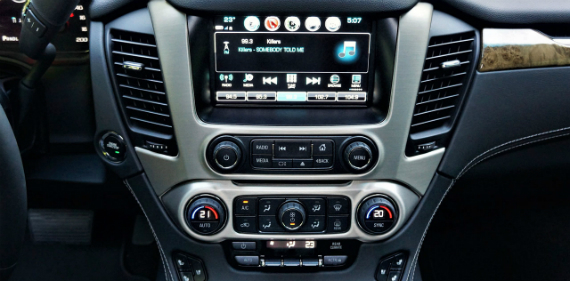
The multi-adjustable driver’s seat was superbly comfortable too, while both front perches were three-way heated and cooled. On this note, GM trucks always provide some of the best seat heaters in the industry, much thanks to squab and backrest elements that can be applied together or separately.
In another nod to this truck and SUV brand, GMC uses real wood trim in the Denali, which is much nicer looking and more substantive feeling than the hollow faux plastic woodgrain found in lesser variants.
The gauge cluster is a mix of analog and digital, the traditional tachometer and speedometer done in a conventional dual-dial design and the center multi-information display an array of clear, bright TFT colors. Four circular ancillary gauges fill out the upper portion, while just below is a large digital speedometer providing default info that can be switched out for other functions. Over on the center stack the infotainment display mimics iPhone/iPad graphics when it comes to bright, clear, colorful intuitiveness, this system extremely easy to use and feature filled, with Apple CarPlay and Android Auto smartphone integration included.
While it’s hard to find much fault with the Yukon, I experienced a couple of issues that could be improved. First, the plastic extrusion surrounding the windshield wiper’s intermittent slider switch on my tester’s left steering column stalk was so sharp it was beyond uncomfortable to touch, making me wary of the entire stalk for fear of being cut. This becomes a big problem for a control that has to be touched so often, and truly inexcusable in this day and age.
The next issue was simply annoying, over-reactive parking sensors. Even in traffic when pulling up beside an adjacent car they caused the seat to vibrate, and not mildly either. Calm drives around town were all too often interrupted by a shocking, almost violent shaking of the driver’s seat that my significant other thought was rude flatulence. You can turn it off, but the system defaults to the on position every time you restart the vehicle. They also come on automatically when reversing, but again the shaking is so aggressive I’d prefer to turn them off.
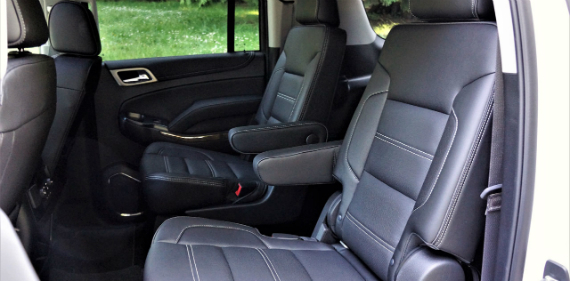
Normally I would also complain about a lack of soft-touch plastics in such a pricey vehicle, but such is only the case on the lower portion of the instrument panel and door panels, which is common in the Yukon’s pickup truck-based SUV class. On the positive, hard shell plastics are usually tough and durable, if somewhat prone to scratching.
The 2017 Yukon Denali XL starts at $82,290 plus freight and fees, which is still tens of thousands less than the equivalent Cadillac Escalade, and about half the price of a nicely loaded up Range Rover. I won’t even try to compare the two, because then we’d need to bring the Bentley Bentayga into the conversation, and that would just be silly. All of these sizable utes serve their markets well, but keep in mind the Yukon is much bigger than any of these pricier options (Escalade aside), especially in XL trim, while it delivers its own kind of downhome average Joe prestige that others can’t easily compete with.
Some features you might appreciate include the aforementioned powered rear seatbacks, which while initially seeming like luxuries might actually be necessities for smaller folk. Two rocker switches on the sidewalls immediately power them down or up, which means you don’t have to climb into the back to do so. A tall person wouldn’t have such an issue, but even someone six-foot-plus might struggle to reach all the way inside in order to manually pull the seatbacks up. The middle seats fold flat by pulling a lever on each outer seat’s base, while if you pull it twice they’ll pop up and out of the way so third row passengers can climb into the rear. It’s roomy back there too, even for adults. Whether loading it up with passengers or cargo, there’s no other SUV anywhere that provides as much capacity.
How big is it? With 39.3 cubic feet behind the third row this XL can manage 24.0 cubic feet more than the regular-wheelbase Yukon, which is already a large full-size SUV. Power those rear seats down and cargo space grows by 19.1 cubic feet over the smaller SUV to total 76.7 cubic feet, while max volume with both rear rows lowered increases by 27.0 cubic feet to 121.7 cubic feet in the XL, making this the grand master of large loads.
If you need to tow more than 8,300 lbs you’ll need to be looking at a regular-length Yukon that can manage 200 lbs more at 8,500 lbs, or go with less passenger space and arguably more cargo capacity by opting for GMC’s Sierra Denali 1500 that can manage up to 9,300 lbs, a regular Sierra 1500 capable of up to 12,500 lbs, or a Sierra HD (heavy-duty) capable of a whopping 23,300 lbs. Still, the Yukon Denali XL’s max trailering weight makes it good for most Airstreams and a lot of family-sized boats.
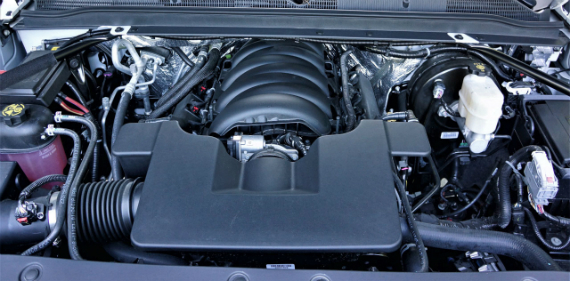
If this were my Yukon Denali XL I’d borrow one of my significant other’s nail files and solve the left stalk problem immediately, and then find the wire that vibrates the seat and give it a quick snip, at which point it would become a near perfect full-size family/gear hauler. Even with these minor irritants, GMC’s Yukon Denali is a superb full-size SUV that’s worthy of its large and loyal following.
*Story credits: Trevor Hofmann, American Auto Press Photo credits: Karen Tuggay, American Auto Press Copyright: American Auto Press *
